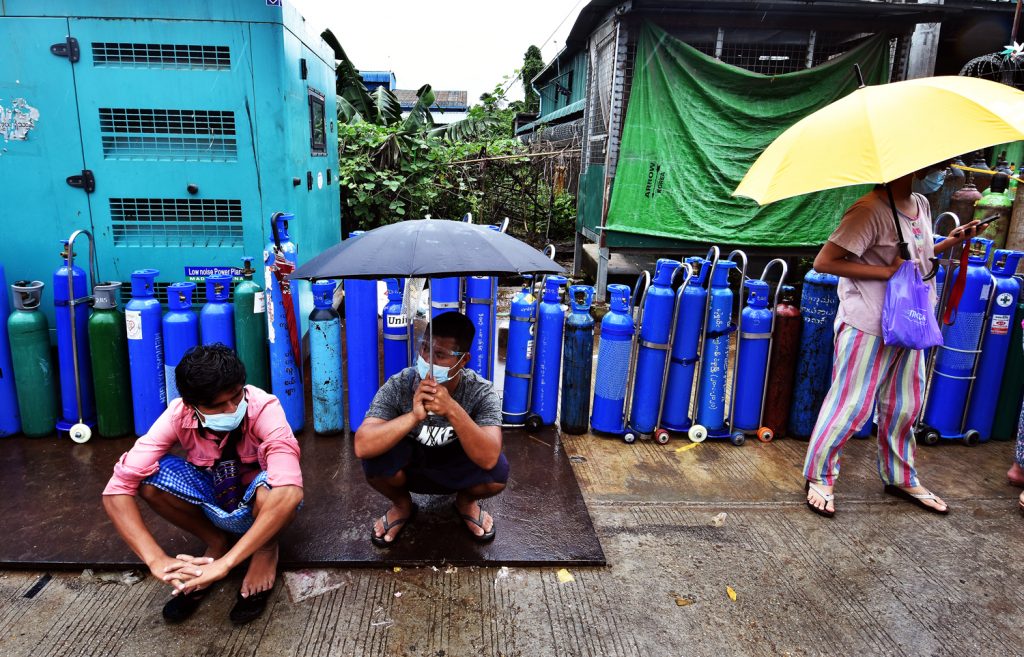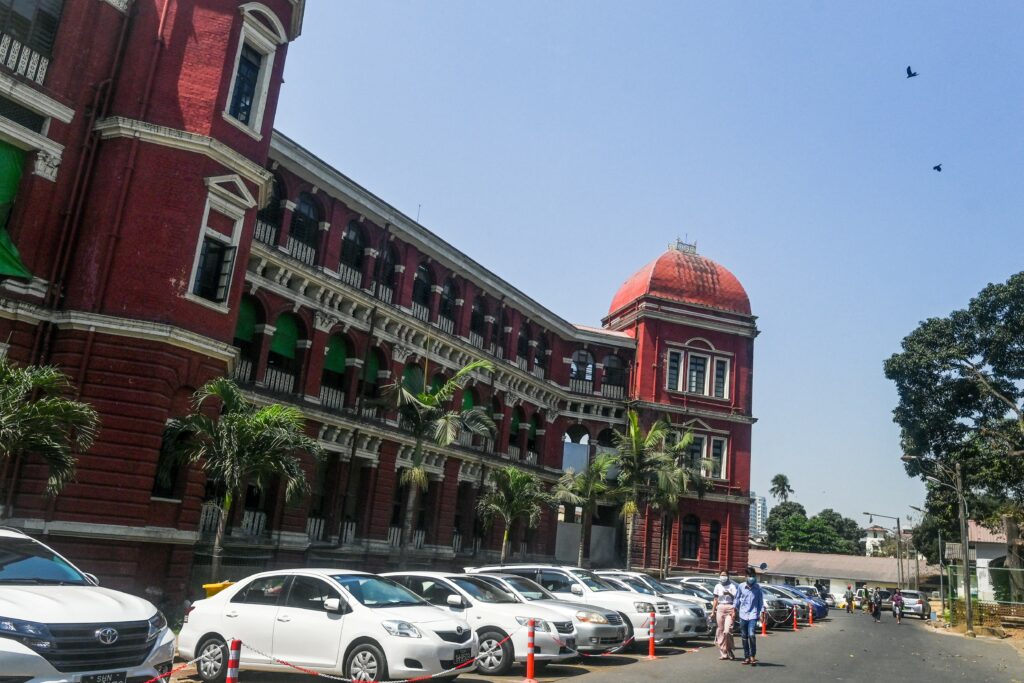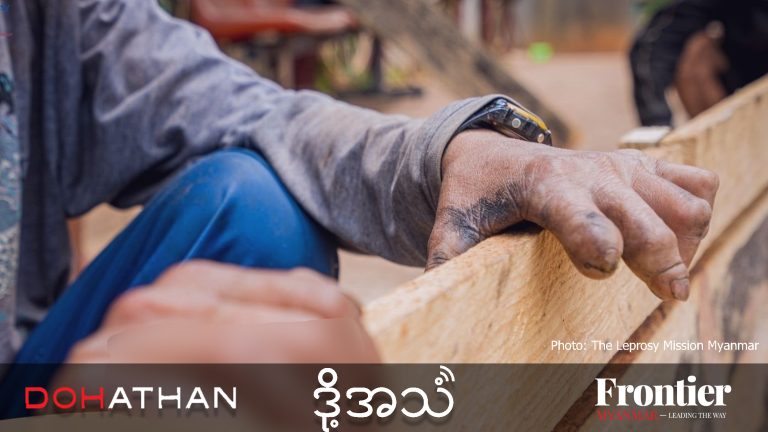As public healthcare deteriorates, some are looking to invigorate the private sector, but bureaucratic dysfunction and regime crackdowns on dissident medics are denying opportunities to all but the well-connected.
By FRONTIER
At 6:30am on a recent Sunday, Ko Hein Htet Aung* rushed his 65-year-old aunt to the emergency department at Yangon’s North Okkalapa General Hospital near where they live. Daw Win Myint, who has diabetes and kidney disease, was having chest pain that could indicate a heart attack.
After a series of tests, doctors said she needed to be admitted for treatment, so she was transferred to the hospital’s Thida ward and put on an intravenous drip.
Hein Htet Aung had to buy the materials himself from a pharmacy outside the hospital. After about 30 minutes, he could tell the drip was malfunctioning but struggled to find a nurse to help.
Before the 2021 coup, Win Myint came regularly to this same public hospital for treatment for her kidney disease. Basic medicine was provided free of charge, and Hein Htet Aung said the level of care was always satisfactory. But, as with many public services, the quality of healthcare has deteriorated hugely since the military takeover.
Years of neglect under previous military regimes saw Myanmar’s public healthcare ranked among the worst in the world. Those who could afford to went to private hospitals, but elites went abroad for better treatment.
The situation began to improve during the failed democratic transition of 2011-2021, although services still lagged behind many of Myanmar’s regional peers. The return to military rule, however, has seen the health sector largely collapse, deepening those class divisions that never fully went away.
Unlike many people in Myanmar amid the post-coup cost-of-living crisis, Hein Htet had the money to ensure his aunt got proper treatment elsewhere. Just a few hours after she was admitted to North Okkalapa General Hospital, he moved her to a private hospital in Insein Township.
“The service at government hospitals is not good at all… We trust and rely more on private hospitals now,” he told Frontier in March. “If I go to a government hospital, I have to buy everything from outside. If I’m going to spend that money, I may as well just use a private hospital.”
Ten doctors at private hospitals in Yangon and Mandalay told Frontier in February that their patient numbers have risen sharply since the coup, largely because government hospitals are too understaffed to provide adequate care.
This staffing shortfall is because state-employed medics have been at the forefront of a mass strike by civil servants known as the Civil Disobedience Movement, which was launched right after the coup with the aim of bringing down the new junta. The CDM Medical Network estimates that more than 46,500 of the health ministry’s 110,000 employees remain on strike.
Some entrepreneurs are looking to take advantage of the situation by investing in private healthcare, but this opening is undermined by onerous red tape and political crackdowns – except for those with good connections.
“As Myanmar’s economy is declining and the hotel and tourism industries are shutting down after the coup, businesspeople want to invest in the private health sector,” said Dr Sithu Soe*, the owner of a private specialist clinic in Yangon. “If a person becomes sick, they will have to seek medical treatment, and investors will get a return on their money.”
“In this situation, the people trust and rely more on private hospitals than before,” agreed Daw Ngu War Htwe, marketing manager of the Dagon Medicare Private Hospital in North Dagon Township, which opened in January last year.

Red tape and crackdowns
A report issued by the Department of Medical Services last year said Myanmar has around 270 private hospitals, more than 200 of which were founded after 2000, and a little over 10,000 private clinics.
Dr Htin Paw, president of the Myanmar Private Hospitals’ Association, told Frontier on March 20 that he had heard that many entrepreneurs were applying for licences to build private hospitals, but didn’t know the exact number. However, this process is often slow; Htin Paw said only an average of four or five new hospitals are licenced each year, and about that many were approved last year.
Frontier was unable to determine from the health ministry exactly how many private hospitals have opened since the coup, however industry sources say it is taking longer to receive approval than under the overthrown elected government.
A private hospital owner in Yangon, U Aung Moe*, said applicants can wait indefinitely for site inspections by authorities from the regime-controlled Ministry of Health, largely due to a lack of ministry staff.
“Before the coup, it took one year to get a licence. Nowadays, even for renewals, it takes one-and-a-half or two years,” Aung Moe said.
Htin Paw agreed that approvals for private hospitals are taking longer. “It’s become much more difficult to build a hospital,” he said.
Dr Su Myat*, who left her job at a private specialist hospital after the coup and is now a volunteer medic in conflict areas, claimed it was easier for businesspeople with a military connection to get a new licence or renew an existing one.
“I am aware of businesses that failed to receive the necessary quality control documents under the former [National League for Democracy] government but got a licence soon after the coup,” she said.
She said one facility in Yangon had its application to provide COVID-19 treatment and testing rejected by the civilian government in 2020 after an inspection but was granted a licence soon after the coup. Another in Mandalay allegedly had its licence suspended for hiring foreign medical workers not approved to work in Myanmar but was re-licenced after the coup.
Besides navigating the junta’s healthcare bureaucracy, another difficulty is finding enough qualified staff.
The private healthcare sector has long relied heavily on medical professionals from the government system. Doctors at state-run hospitals have traditionally supplemented their relatively low government salaries by moonlighting at private hospitals and clinics.
An MPHA official, who asked not to be identified for security reasons, said about 90 percent of the staff at the country’s 270 private hospitals also worked at government hospitals before the coup.
But the junta responded to the CDM with a crackdown. In February this year, the parallel National Unity Government’s health ministry and the Assistance Association for Political Prisoners said that 335 health ministry staff have been arrested for joining the CDM and 83 have been killed by the military. The regime has also arrested owners of public hospitals for employing CDM workers, leading many to stop employing striking medical personnel for fear of retribution.
“When the CDM medical staff were pressured, the private hospitals began to force out the CDM staff,” said Dr Thuzar Htwe*, who, similar to Su Myat, quit her job at a private hospital in Yangon seven months after the coup and now provides care to people displaced by conflict.
Nearly 300 medical officers at 17 private hospitals signed a statement in 2021 objecting to an MPHA policy to suspend healthcare workers who had joined CDM. More than 50 of the doctors who signed the statement also resigned in protest, including Thuzar Htwe.
Dr Tun Min*, who owns a private specialist clinic in Yangon’s Eastern District, said the crackdown had contributed to a shortage of skilled, experienced healthcare personnel at private clinics.
Ngu War Htwe from the private hospital in North Dagon agreed. “The number of patients coming to the hospital is high, but the number of doctors is low,” she said.
“We have to do a lot of training to upgrade their skills,” Tun Min said of the remaining staff at private institutions, but added that some employers prefer to do this than pay for higher skilled workers anyway. “Mid-level clinics can’t pay the salaries demanded by medical professionals who have the skills they need. We have to find employees that we can pay less and retrain them.”

Pharmaceutical privileges
After the coup, Myanmar’s healthcare sector was also roiled by a medicine shortage and surge in prices. First sparked by the brutal Delta wave of COVID-19 infections in mid-2021, prices returned to normal when cases subsided, but then rose again steeply the following year due to the junta’s import restrictions and the decline of the kyat.
“We have urged many pharmaceutical companies not to raise prices if possible,” said Htin Paw, adding that political changes only have an “indirect” impact on the private health sector, contrary to most available evidence.
Because most medicine in Myanmar is imported, prices fluctuate according to the US dollar rate. When the dollar goes up, the price of medicines goes up, said U Tin Win, who owns the Win Myinttar pharmacy in Yangon’s Thaketa Township. After a turbulent 18 months, the kyat-dollar exchange largely stabilised in August last year, though it remains far below its pre-coup level.
Today, there doesn’t appear to be a shortage of medicine on the wholesale market, and pharmaceutical prices are also stable, but some remain high. Before the coup, a packet of 10 Decolgen tablets, for relieving the symptoms of colds or influenza, cost K1,400, but now it’s K2,200.
Convoluted restrictions on importing pharmaceuticals remain in place, although importers say it is slightly easier compared to last year. They must still get approval from the Union of Myanmar Federation of Chambers of Commerce and Industry, the junta’s health ministry, the Foreign Exchange Supervisory Committee and the Trade Department, and must also secure US dollars from a private bank.
Pharmaceutical importers say they also need a licence from the Food and Drug Administration to start importing new types of drug. Before the coup, this took about six months, but now can take eight months to a year.
As is often the case with red tape, the restrictions are a disadvantage for those without connections, but an opportunity for those close to the regime. A pharmaceutical importer in Yangon claimed companies affiliated with the Myanmar Pharmaceutical and Medical Device Manufacturer Association get their licences approved much more quickly. Like many business associations, it has maintained close relations with the regime.
“They are getting opportunities from the military coup,” said the importer.
* denotes the use of pseudonym for safety reasons







